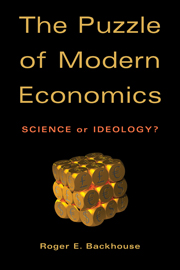Book contents
8 - Science and Ideology
Published online by Cambridge University Press: 05 June 2012
Summary
FROM THE MIXED ECONOMY TO FREE-MARKETS
At the end of the Second World War, there was, outside the Soviet bloc, broad acceptance of the need for a mixed economy. There were differences over where to draw the line between the private and public sectors (for example, should basic industries be nationalized?); over the best form of economic planning, and over the appropriate level of redistribution, but the principle that the state should have a presence in economic activity was widely accepted. This had been the result of the perceived success of planning in the United States and Britain during the Second World War. Keynesian economics had established the idea that macroeconomic planning was needed to ensure full employment, which had been adopted as an objective in both countries after the war. Many of those involved in developing mathematical models were supporters of planning, several of them, including Jacob Marshak, research director of the Cowles Commission, having been on the socialist side of the interwar debate about whether or not it was possible to have an efficient planned economy.
Support for a mixed economy was a far cry from support for Soviet-style central planning, even though the British Labour government of 1945–51 did embark on a programme of nationalizing significant parts of British industry. On the other hand, American businessmen who had dismissed the New Deal as ‘socialism’, had good reason to be suspicious of economists.
- Type
- Chapter
- Information
- The Puzzle of Modern EconomicsScience or Ideology?, pp. 137 - 151Publisher: Cambridge University PressPrint publication year: 2010



